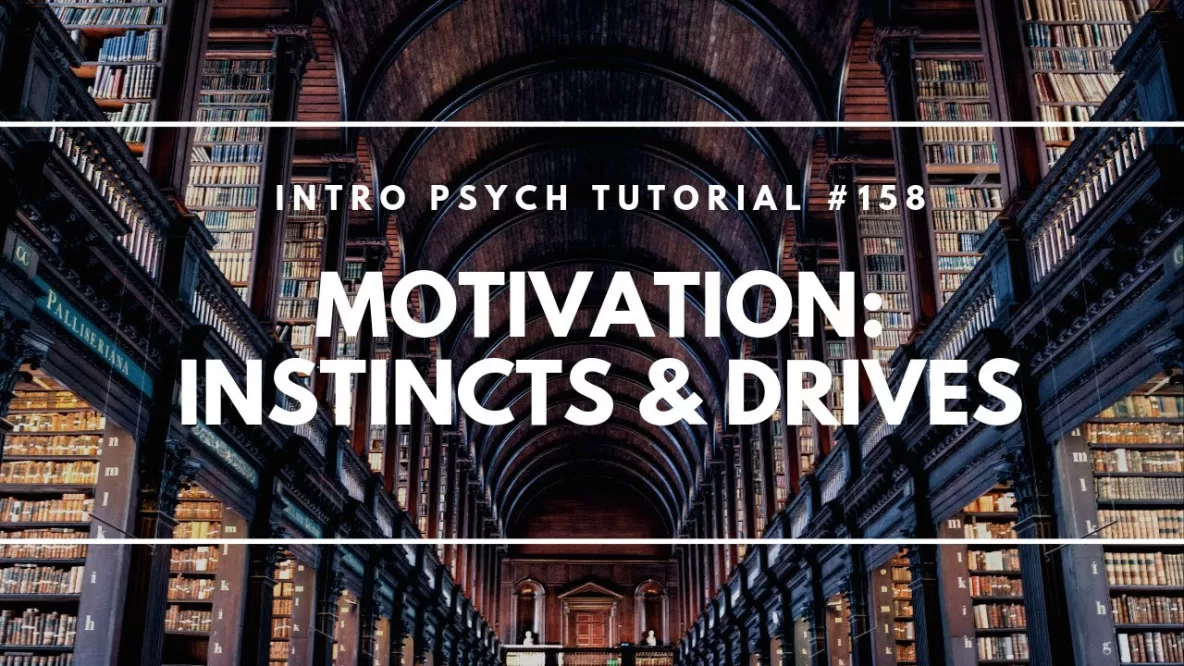www.psychexamreview.com In this video I describe two theories of motivation; the concept of instincts and drive theory. Instincts referred to inherited tendencies that were considered to motivate behavior without any prior experience. Later, drive theory proposed that departures from an optimal state motivated behaviors that would return the organism to that optimal state.
Don’t forget to subscribe to the channel to see future videos! Have questions or topics you’d like to see covered in a future video? Let me know by commenting or sending me an email!
Check out my psychology guide: Master Introductory Psychology, a low-priced alternative to a traditional textbook: http://amzn.to/2eTqm5s
Video Transcript
Hi, I’m Michael Corayer and this is Psych Exam Review. In the previous video I talked about how emotions guide our behavior by telling us what feels good and what feels bad, so this brings us to the idea of motivation because we could say that our emotions motivate us to seek out or avoid certain situations. So in the next few videos we’re going to look at the topic of motivation in more detail.
One early theory of motivation that we’ll start with, is based on the idea of instincts. So around the end of the 19th century into the beginning of the 20th century psychologists like Wilhelm Wundt and William James became interested in the idea of instincts. And so what an instinct referred to was an inherited tendency that was activated by the environment and that motivated a certain behavior. The idea was that no previous experience was needed for this motivation of behavior to occur. So you might think about some behavior like seeking out food, this would be an example of an instinct. And then they would say that everybody is motivated to seek out food and they don’t have to learn this behavior. It’s innate and it emerges naturally.
So psychologists quickly began trying to investigate certain behaviors that they thought fit the idea of instincts, that they would emerge naturally based on something in the environment and that no previous learning was necessary. Now, one of the problems that they ran into, of course, is how do you determine whether previous learning was necessary or not? How do we know which supposed instincts are truly inherited and which ones are learned? It’s not actually a very easy question to try to answer.
Another problem that they ran into is they quickly came up with thousands of possible instincts, and it seemed like they were coming up with instincts very rapidly but they weren’t necessarily explaining them. So the question that arose was whether we were just relabeling all sorts of behaviors that we already knew existed. So for instance we already know that people seek out food and may be calling that some sort of instinct, giving that a new name, doesn’t really explain it in any way. It’s just a new name, not a new explanation.
So by the beginning of the 20th century the idea of instincts was already starting to fade and this was also due in part to the rise of behaviorism. Because behaviorists placed a great emphasis on learning and experience and that the environment would influence behavior but it would be the result of learning and experience, and rewards, and punishments, and reinforcements, things like this. But even the most strict of behaviorists would have to admit that we do seem to have some behaviors that appear to be innate. So, for instance, we could take a rat and put it in an operant chamber and if the rat has been fed recently and it’s not hungry, then it won’t eat, even if there’s food available. And yet hours later, with no change in the environment, with no new stimulus being added to the chamber here, the rat might begin eating. And so we have a change in behavior without any obvious change in the environment or without any new stimulus. And so this would indicate that there’s something going on here, there’s something changing, there’s something that’s influencing behavior.
And rather than use the term instincts, what behaviorists did was they came up with a new term and they referred to drives. So the idea of a drive was the idea that well you have some optimal state that an organism wants to be in. And a drive refers to a behavior that will help return the organism to that optimal state. So a drive emerges when you deviate from your optimal state. So in the case of the rat in the operant chamber here, that when he first is in there he’s not hungry, you know, he’s full he has some optimal state of energy in his body, and that over time that’s going to dissipate and as a result, he’s gonna get below this optimal state. And that’s going to be what motivates him to return to that optimal state. That’s going to cause him to engage in a behavior like eating that’s designed to return him to the optimal state. And so there we would talk about a hunger drive that’s motivating behavior, rather than an instinct. And in the next video we’ll look at this idea of drives in more detail. So I hope you found this helpful, if so, please like the video and subscribe to the channel for more. Thanks for watching!

